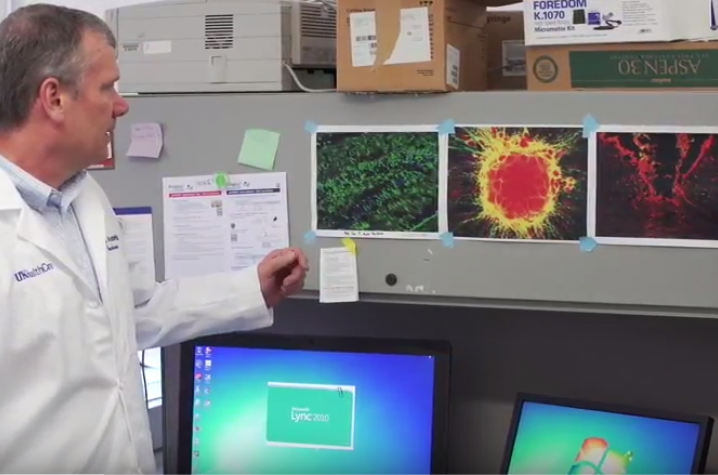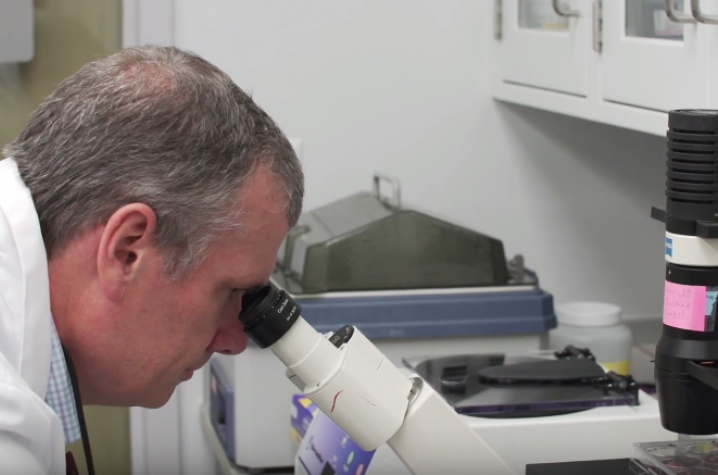New Life Breathed into Lung Cancer Study Initiated 15 Years Ago
Video by UK REVEAL Research Media.
LEXINGTON, Ky. (Aug. 17, 2016) – In the late 1990s, University of Kentucky Professor Douglas Andres found that mutations in a protein known as RIT1 could initiate cancer development in laboratory models.
RIT1 works as a molecular switch. In response to signals from outside the cell, it turns on fundamental cellular activities, and then turns them off again to ensure they don’t continue unchecked.
“Proteins like RIT1 control everything from how cells differentiate to how they grow,” Andres said. “In a disease like cancer, they often get broken in the ‘on’ position. The cells that have RIT1 mutations constantly grow, even though they don’t receive the necessary signals from the environment.”
When Andres applied for funding to follow up on his findings, his application was declined. The reviewers of his grant wanted evidence that RIT1 mutations might actually promote cancer development in people. Unfortunately, searching for RIT1 mutations in human tumors was, at that time, a difficult undertaking. The technological advances required to successfully complete this mission would not be made until several years later.
But Andres didn’t lose hope. “I never really give up on anything,” he said.
Just over a year ago, his patience was rewarded – Alice Berger, a postdoctoral researcher in the laboratory of Professor Matthew Meyerson at the Broad Institute of MIT and Harvard, provided the evidence he needed. Working collaboratively, the research teams led by Andres and Meyerson showed what Andres had hypothesized all along: RIT1 mutations present in human lung cancers can transform non-cancerous cells into cancerous ones.
Now, after waiting more than 15 years, Andres has finally been awarded the funds to expand upon his initial discovery. Specifically, the breakthroughs gained from his collaboration with Meyerson helped him secure a two-year, $150,000 grant from the Kentucky Lung Cancer Research Program.
“With the grant we received, we will push the work forward,” Andres said. “We hope this will lead to greater understanding of RIT1 mutations and how tumors containing them may differ from other lung tumors.”
Ultimately, Andres hopes to use the insight obtained from these efforts to develop new tests that can diagnose RIT1-mutant lung cancers in patients. The awareness gained from such efforts could potentially lead to the development of therapies that specifically kill cancer cells containing RIT1 mutations.
“Each time that we gain fundamental insight into a problem – that is an exhilaration,” Andres said. “Sometimes it happens in six months of work, or, in this case, it's taken 15 years between our initial discovery and our ideas actually coming to fruition.”
UK is the University for Kentucky. At UK, we are educating more students, treating more patients with complex illnesses and conducting more research and service than at any time in our 150-year history. To read more about the UK story and how you can support continued investment in your university and the Commonwealth, go to: uky.edu/uk4ky. #uk4ky #seeblue
MEDIA CONTACT: Allison Perry, (859) 323-2399 or allison.perry@uky.edu







